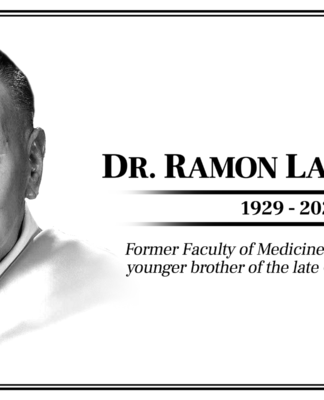DO YOU find yourself needing the approval of others to feel good about yourself? Do you tend to avoid or ignore responsibilities? Do you find it difficult to express your feelings? Do you find yourself waiting for disaster to strike even when things are going well in your life? Do you find it difficult to trust others?
If you answer yes to all of those questions, you are probably displaying the effects of living in a dysfunctional family and may want to consider seeking some help.
Help was what a two-day campus conference, dubbed “Moving Thomasian Families for Life and Love,” offered to its participants last Oct. 22-23 at the Thomas Aquinas Research Complex Auditorium.
In his keynote address, UST Rector Rev. Fr. Tamerlane Lana, O.P. recognized the critical position of the family.
“There is now a strong perception that the infrastructure of the family has been deteriorating over the years. The foundations to build family have weakened. The relationship between marriage and the family is now under question because of the tendency to deny or downplay the stable union and the consequent responsibility,” Fr. Lana said.
The conference, which was organized by the UST Campus Ministry and Human Life International-Asia (HLI) was composed of sessions and workshops “Conspiracy Against Life and Family,” “Healing the Family Tree,” “Coping with Stress in Marriage and Family,” and “What Children Need from their Parents,” which were discussed by speakers from HLI, Edna Garayblas-Monzon, M.D., Sis. Florecilla Inzon, O.P., M.D., Anita Meily, and Orestes Monzon, M.D., respectively.
One of the interesting sessions was “Understanding Dysfunction in the Family” by Human Life International-Asia couple, Marlon Ramirez and Ianessa Ang-Ramirez, M.D.
According to Mr. Ramirez, forms of neglect are prevalent in a dysfunctional family.
“Some parents literally abandon their children. They isolate themselves from them. Another form of neglect is pampering. Lagi kang wala sa bahay that’s why you always give your child presents to substitute for your presence,” Mr. Ramirez said.
“Children who come from a dysfunctional family or those who have suffered rejection find a hard time relating with other people. And again, we must say that rejection begins in the womb…children who are rejected have very hard time in trusting people,” he said.
The couple described a dysfunctional family. “In a dysfunctional family, parents and/or adult caregivers communicate dysfunctional rules and prohibit family members from generating life based on their core gifts and talents,” they said.
According to them, in dysfunctional families, abuse and neglect are perpetrated upon the child and are enforced by the “don’t” rules such as: “it’s not ok to talk about problems,” wherein the family act as if there is nothing to be bothered about because everything is going well; “feelings are not openly expressed”; “communication is often indirect, with one person acting as messenger”; “unrealistic expectations: be good, right, perfect, make us proud” which pressures the child to meet the expectation of parents; “do as I say, not as I do,” which is manifested by parents who do not practice what they preach; “don’t be selfish,” wherein every member of a family is somehow obliged to take a share of sacrifice for the family; “it’s not ok to play,” which limits the child’s self-exploration; and “don’t rock the boat,” which parents remind their children to live up to the society’s expectation.
According to Dr. Ramirez, a child raised in a dysfunctional family suffers symptoms of post-traumatic stress.
“A dysfunctional family is not merely a family that has problems,” Ramirez said. “It is a family that refuses to confront its problems. And every family with children has the responsibility of attending to their emotional need, such as acceptance, appreciation, approval, affirmation, and affection.”
In dysfunctional families, Mr. Ramirez said, the tendency of the children is to assume survival roles, such as the “family hero,” those who give up his own needs and feelings to make things right, usually played by the eldest child,”; “the protector, “those who give in to other people’s request;” and “the mascot or comedian” which is usually played by the youngest child to help to release tension in the family.
“Our first experience of God begins at home, Mr. Ramirez said. “It can be completely or partly manifested only by the love of our biological parents. And perhaps it can even compose more. Our first experience of hell begins in the family. And the first experience of hell can begin in the family also.”
The couple said there is one solution to dysfunction. “The hurting inside began in the womb and continues for the rest of our lives until and unless trust is restored,” they said. “All childhood pain results in spiritual bankruptcy.”















